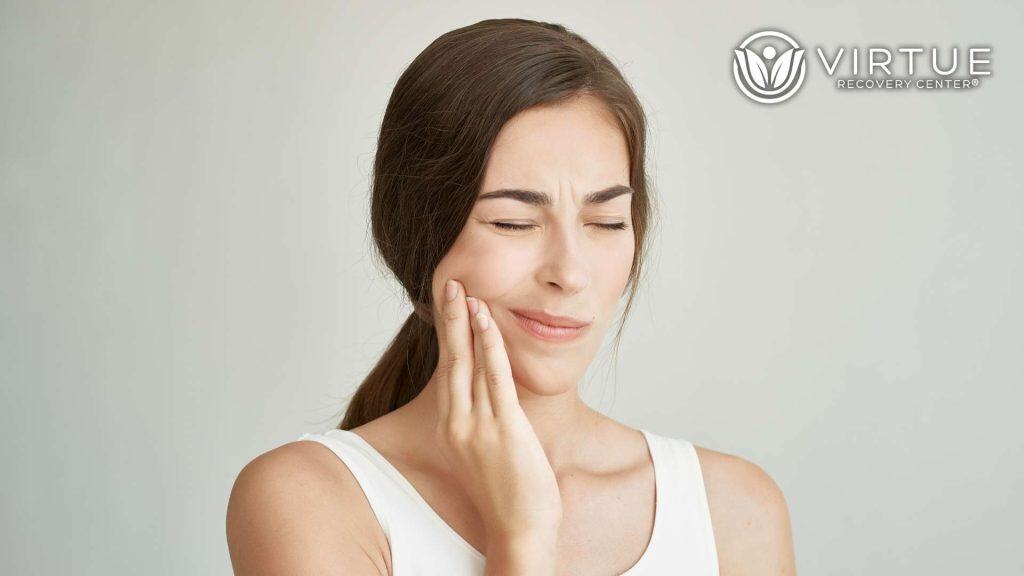Key Takeaways
- Some drugs and medications can cause bruxism—a condition where people grind their teeth or clench their jaw.
- Common culprits include methamphetamine, ecstasy, cocaine, and SSRIs (antidepressants).
- Long-term bruxism can lead to tooth damage, jaw pain, and sleep issues.
- If drug use is causing bruxism or other health problems, treatment can help.
Introduction
Waking up with a sore jaw. Noticing your teeth feel sensitive. Getting headaches for no clear reason. These might not just be everyday stress—they could be signs of bruxism, also known as teeth grinding or jaw clenching. What many people don’t realize is that certain drugs and medications can cause or worsen this condition. Whether it’s something prescribed or used recreationally, these substances may trigger involuntary muscle movements, especially in the jaw. In this article, we’ll break down what bruxism is, which drugs are linked to it, and how to protect your health—especially if drug use is a factor.What Is Bruxism?
Bruxism is a condition where a person grinds their teeth or clenches their jaw, often without realizing it. It can happen while you’re awake or asleep. There are two main types:- Awake bruxism, usually linked to stress or anxiety
- Sleep bruxism, which happens during sleep and may be harder to notice
- Jaw pain or tightness
- Headaches, especially in the morning
- Worn-down or sensitive teeth
- Cracked enamel or tooth damage
- Sore facial muscles
Which Drugs and Medications Can Cause Bruxism?
1. Stimulant Drugs (Methamphetamine, Cocaine, Ecstasy/MDMA)
Some of the most common drugs that cause bruxism are stimulants. These drugs speed up the nervous system and increase energy, focus, and even euphoria. But they can also cause:- Jaw clenching
- Tooth grinding
- Dry mouth (which worsens tooth damage)
- Increased muscle tension
2. Antidepressants (SSRIs and SNRIs)
Some prescription antidepressants can also lead to bruxism. These include:- Fluoxetine (Prozac)
- Sertraline (Zoloft)
- Paroxetine (Paxil)
- Venlafaxine (Effexor)
3. Antipsychotics and Mood Stabilizers
Medications used to treat bipolar disorder, schizophrenia, and other mental health conditions can also lead to jaw clenching. These include:- Risperidone (Risperdal)
- Aripiprazole (Abilify)
- Haloperidol (Haldol)
4. ADHD Medications
Drugs like Adderall, Ritalin, and other amphetamine-based treatments for ADHD are linked to increased muscle activity and tension. This can lead to:- Daytime jaw clenching
- Nighttime teeth grinding
- Facial discomfort or tightness
5. Other Substances and Risk Factors
Even substances like caffeine, nicotine, and alcohol can make bruxism worse. Other drugs like buspirone, used for anxiety, have been linked to teeth clenching in some people. Stress, sleep disorders (like sleep apnea), and anxiety also raise the chances of grinding your teeth—whether you use drugs or not.What Happens If You Don’t Treat Bruxism?
When left untreated, bruxism can cause serious damage to your teeth and jaw. Some common problems include:- Tooth enamel loss
- Cracks or chips in teeth
- Tooth sensitivity
- Receding gums
- Jaw pain or stiffness
- Temporomandibular joint disorder (TMJ)
Can Bruxism Caused by Drugs Be Reversed?
Yes, in many cases, bruxism improves when the drug is reduced or stopped. This is especially true for people whose jaw clenching started after starting a medication or using a new substance. Some solutions include:- Switching or adjusting medication, under doctor supervision
- Using a mouthguard at night to protect your teeth
- Treating the root cause, such as addiction, anxiety, or depression
- Practicing relaxation techniques or stress management
- Seeking treatment for any co-occurring mental health conditions
When Bruxism Is Linked to Substance Use
For some people, bruxism is a warning sign of something deeper—substance misuse or addiction. Stimulant drugs, in particular, are highly addictive and can create lasting changes in the brain and body. If you find that:- You’re grinding your teeth more after using drugs
- Your jaw feels tight during or after partying
- You’ve noticed damage to your teeth or gums
- You use drugs to escape stress, anxiety, or sadness
How Virtue Recovery Houston Can Help
At Virtue Recovery Houston, we understand how drug use can affect more than just your mind. It impacts your entire body—including your teeth, jaw, and emotional well-being. We offer:- Medical detox for safe withdrawal
- Therapy to explore triggers behind drug use and bruxism
- Dual diagnosis treatment for co-occurring mental health issues
- Support for oral and physical health during recovery
- Long-term planning to prevent relapse and build a healthier life
Conclusion
Jaw clenching and teeth grinding may seem like small issues—but they can be signs of something bigger. Whether caused by prescription medication or drug use, bruxism can seriously affect your health if not addressed. The good news is, there are ways to treat it—and even better, there’s help if substance use is part of the problem. Call 866-457-4811 today to speak with someone at Virtue Recovery Houston. Your health matters, and we’re here to help you protect it.Are There Drugs That Cause Both Substance-Induced Psychotic Episodes and Jaw Clenching or Teeth Grinding?
Certain drugs can indeed lead to both substance-induced psychotic episodes and physical symptoms such as jaw clenching or teeth grinding. Stimulants like cocaine and methamphetamine are known substanceinduced psychosis triggers, often exacerbating anxiety and paranoia, which can result in these involuntary movements and tensions in the jaw.
FAQs About Drugs That Cause Jaw Clenching, Teeth Grinding, & Bruxism
What drugs are known to cause bruxism or jaw clenching?
Stimulants like meth, cocaine, ecstasy, and ADHD medications, as well as antidepressants like SSRIs, can cause bruxism and jaw clenching.How can I protect my teeth if I grind them at night?
A dentist may recommend a nightguard. More importantly, addressing the root cause—like drug use or medication side effects—is key.Is bruxism a sign of drug addiction?
It can be. Bruxism, especially when combined with drug use, may point to underlying substance misuse that requires treatment.Where can I get help for substance use and bruxism?
Call 866-457-4811 to connect with Virtue Recovery Houston. We’ll help you understand your options and support your full recovery.How does bruxism affect dental health?
Bruxism may cause significant dental problems, including tooth wear, missing teeth, and pain due to the excessive pressure exerted on the teeth and jaw.What is the difference between sleep bruxism and awake bruxism?
Sleep bruxism occurs during sleep, often without awareness, while awake bruxism involves the conscious clenching of the jaw all the time, typically in response to stress or anxiety.Can bruxism be an effective treatment for any condition?
No, bruxism is not an effective treatment for any condition; rather, it is a symptom that can lead to dental and jaw problems and should be addressed with appropriate treatment.What are some common signs of bruxism?
Common signs of bruxism include jaw pain, headaches, tooth sensitivity, and noticeable wear on teeth, which may lead you to clench your jaw more frequently.Can sleep apnoea contribute to bruxism?
Yes, sleep apnoea may cause disrupted sleep patterns, which can increase the risk of nocturnal bruxism and related dental issues due to the stress placed on the jaw and teeth.Are Fentanyl Users at Increased Risk for Jaw Clenching and Teeth Grinding?
Research indicates that fentanyl users may experience increased muscle tension, leading to symptoms like jaw clenching and teeth grinding. As the crisis of fentanyl use escalates, the alarming statistics of fentanyl fatalities in texas revealed a grim picture, underscoring the urgent need for awareness and intervention.








